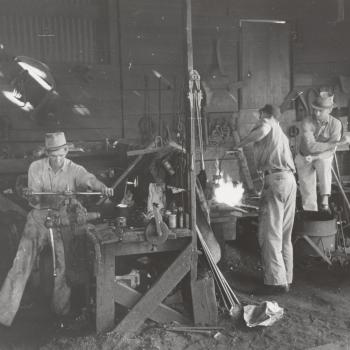Alexis de Tocqueville (1805-1859) devoted a chapter to “Associations in Civil Life” in his percipient Democracy in America (Doubleday, 1835 & 1840). “Americans of all ages, all stations in life and all types of dispositions are forever forming associations,” he writes. They are “of a thousand different types—religious, moral, serious, futile, very general and very limited… Americans combine to give fetes, found seminaries, build churches, and distribute books… Finally if they want to proclaim a truth or propagate some feeling…they form an association.”
Why did de Tocqueville find this interesting? It is because voluntary associations are essential to democracy. In authoritarian societies a central agency administers everything. In totalitarianism, by definition, there are no voluntary labor groups, no independent newspapers, and no genuine religious pluralism. “At the head of any new undertaking, where in France you would find the government or in England some territorial magnate, in the United States you are sure to find an association,” de Tocqueville concludes.
It is important these days to appreciate that a person stands up for freedom each time she or he volunteers at church, at the food pantry or in the tutoring center. To attend a union meeting or serve on the board of a non-profit agency or to promote a civic organization is an exercise in patriotism.
Of course, our voluntary associations need to raise money voluntarily. To that end Bob Connolly of Milwaukee, who gives seminars on “the art of raising money,” has distilled his wisdom in a short booklet, How To Raise Money (available from NCL, PO Box 291102, Chicago, IL 60629; $7 pre-paid). It is not a road map to foundations, though even professional fundraisers who adeptly submit boilerplate proposals can learn from the booklet. It is not a how to check list unless the reader is convinced that a proper philosophy is the basis for all successful how to advice. Connolly, drawing from decades of civic and church involvement, offers a half-dozen or so principles that must accompany every fundraising campaign.
“Money is never the problem,” Connolly writes. Yet many voluntary associations are in desperation mode as they appeal one more time for money. Yes, changing demographics can strain a parish budget. Yes, the negligence of bishops can discourage donors at the parish level. Yes, the general public swings hot and cold on causes. Yet, money is never the problem. To start with that premise means to chose between either closing the association or accelerating desperation fundraising.
The problem is a paucity of relationships, Connolly repeatedly says. The association’s relationships are too few and too shallow. In other words, people give to people. Donors give to those they know and trust. Thus Connolly in a few sentences outlines the disciple of building relationships. It is tedious. Initially it is outside the experience of most church leaders, civic activists and club members. It is, however, the only way to have a dependable and independent revenue stream for a voluntary association.
In several of the booklet’s eight chapters Connolly explains why people might donate to an organization. “When you ask people to consider giving, you are offering them an opportunity” to make a difference in the world and to “grow as a giving person,” he says. Thus after a relational foundation is established, it is disrespectful not to ask. Connolly once helped a parish with a fundraising campaign. The pastor told him not to approach a certain woman because she was seemingly on a limited budget. As days went by, the woman confronted the pastor: “Why has no one come to the house asking for my donation?” She felt excluded. There’s an adage in retail politics: “Ask a favor; make a friend.”
Wholesome fundraising proceeds with no assumption about who will give or who won’t give. It will fail if based on guilt, Connolly adds.
Connolly’s booklet is about attitude and philosophy. It does though contain some tips. For example, an annual campaign at the same time each year is better than scattershot appeals. Most current donors, he convincingly shows, can increase their gift by tenfold. Not ten times more each year, but ten times more at the initial launch of a campaign. Presuming the discipline of relationships is occurring and that no guilt trip is conveyed, the $10 donor can give $100.
A subsequent Working Catholic column will consider how to approach foundations, how to think about event fundraising and comment on the standard weekly collection at churches.
Droel is associated with National Center for the Laity (PO Box 291102, Chicago, IL 60629)











